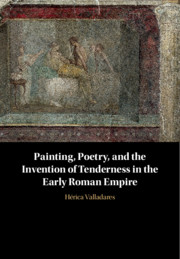Book contents
- Painting, Poetry, and the Invention of Tenderness in the Early Roman Empire
- Painting, Poetry, and the Invention of Tenderness in the Early Roman Empire
- Copyright page
- Dedication
- Contents
- List of Plates
- List of Figures
- List of Tables
- Acknowledgments
- Introduction On Roman Tenderness
- One The Tenderness of Lovers
- Two The Tenderness of Monsters
- Three The Tender Interior
- Epilogue Tenderness Transformed
- Notes
- Bibliography
- Index
Introduction - On Roman Tenderness
Published online by Cambridge University Press: 26 November 2020
- Painting, Poetry, and the Invention of Tenderness in the Early Roman Empire
- Painting, Poetry, and the Invention of Tenderness in the Early Roman Empire
- Copyright page
- Dedication
- Contents
- List of Plates
- List of Figures
- List of Tables
- Acknowledgments
- Introduction On Roman Tenderness
- One The Tenderness of Lovers
- Two The Tenderness of Monsters
- Three The Tender Interior
- Epilogue Tenderness Transformed
- Notes
- Bibliography
- Index
Summary
The introduction examines the pre-history of the elegiac ideal of a life of love. Although Latin love elegy and tender depictions of lovers in Roman wall painting may be described as Augustan phenomena, their roots lay in the ethical and aesthetic transformations that marked the Republican era. From the construction of luxury villas along the Italian coast to the emergence of a more personal style of poetry, we see in this period a new valuation of private life and a growing concern with individual experience among Rome’s aristocracy. Catullus’ poems to Lesbia represent the apogee of this turn toward the intimate and the private. In his verses we see for the first time the fusion of domus (home) and amor (erotic passion) – concepts long seen as mutually exclusive. Catullus’ domestication of erotic passion thus prefigures the elegists’ rejection of Augustan morality and their own construction of an alternative worldview. The poets’ witty appropriation of familial and marital terms also points to the codification of amatory experience in Roman literature and, later, in art. In both images and texts, erotic tenderness manifests itself through a series of metonymies that render love an experience that can be recognized, learned, remembered, and recounted.
- Type
- Chapter
- Information
- Publisher: Cambridge University PressPrint publication year: 2020



